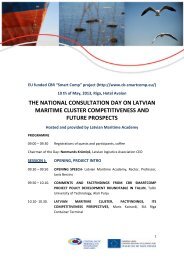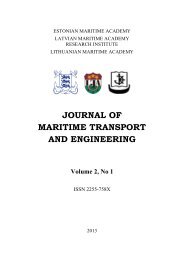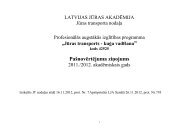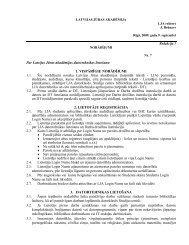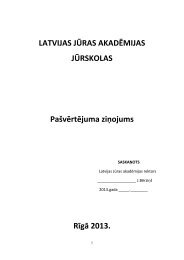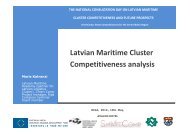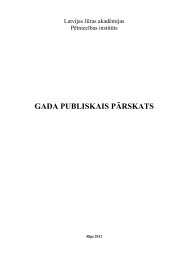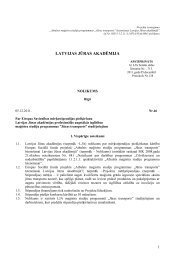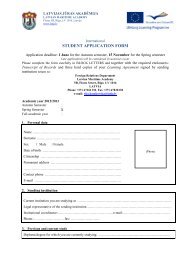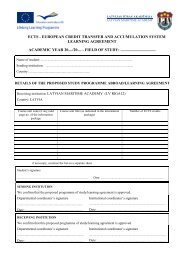14. starptautiskÄ konference 2012 - Latvijas JÅ«ras akadÄmija
14. starptautiskÄ konference 2012 - Latvijas JÅ«ras akadÄmija
14. starptautiskÄ konference 2012 - Latvijas JÅ«ras akadÄmija
Create successful ePaper yourself
Turn your PDF publications into a flip-book with our unique Google optimized e-Paper software.
Proceedings of 14th International conference „Maritime Transport and Infrastructure - <strong>2012</strong>”The proposals were accepted by the MCA who supported the creation of a Certificate ofCompetency to the IMO during the 2008 revisions of the existing Standards of Training andCertification of Watch keepers (STCW) at the next STW meeting.This proposal was also supported by France, Bulgaria, China, and Malaysia amongst othermaritime administrations. There were detractors who did not want the imposition of an extra level ofmanning onboard, but the STCW proposals did not dictate that the carriage of ETO would bemandatory, only that a new standard of certification be provided for those employers who needed toassess the competence of their ETO employees.This opposition was resolved by the creation of two levels of electrical technician level withinthe new stcw regulations, an Electro-technical Rating and Electro-technical Officer.The level of skills and knowledge required at the two levels are differentiated by the low levelof fault finding knowledge required by the Rating and the reduce scope of their expected workingenvironment. The full STCW skills and knowledge tables are replicated in the appendix C, and theseillustrate that the ETO would be required to undertake bridge electronic navigation repairs andmaintenance, whereas this role is excluded from the Ratings role.Whilst the STCW 2010 code only includes the Operational level, there was a need, identifiedby the UK industry representatives, to differentiate certification even further especially for the higherlevels of ETO ranks which exist in large cruise liners, where the ranks of Chief Electro-technicalofficer at the management level are well established. Whilst this rank and responsibility may not yethave been recognised by the IMO through their STCW certification, the UK maritime authority may infuture recognise the higher certification that reflect the higher knowledge and skills at the managementlevel.Experiences to dateThe first programme started in September 2009 with 12 entrants from six different shippingcompanies. The experiences and observations of the students were recorded during the first collegetraining phase.TRB & Sea phase Preparation for sea phase; all candidates know their training officer but have not yet beenassigned their ships or onboard training officers Concern that they need an ETO on their ship to be able to complete their TRB, but this wouldonly be encouraged for the specialist tasks within one section (C35), otherwise the ChiefEngineer could sign the candidate off as competent The use of the TRB was raised and the students were made aware of its purpose and that theywere to have a briefing session before they leave the first college phaseFoundation Degree elements College courses has assumed that a certain level of prior knowledge from students when this isnot the case for all students Too much overlap between topics when some items are taught more than once They do not believe they have missed anything out re theory at the moment Query on the inclusion of mechanical theory elementsWorkshop skills Practical tasks are easier for some candidates than others Prior knowledge of practical task theory would assist understanding There is a lot of shuffling around for the practical tasks and the time required to completecertain tasks is very tight13



